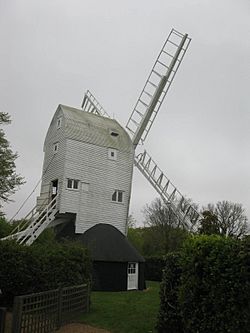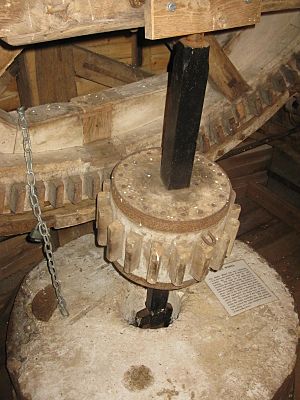Stocks Mill, Wittersham facts for kids
Quick facts for kids Stocks Mill, Wittersham |
|
|---|---|

The mill as it looked in May 2016
|
|
| Origin | |
| Grid reference | TQ 912 272 |
| Coordinates | 51°0′48″N 0°43′33″E / 51.01333°N 0.72583°E |
| Operator(s) | Kent County Council |
| Year built | 1781 |
| Information | |
| Purpose | Grinding corn |
| Type | Post mill |
| Roundhouse storeys | Single storey |
| No. of sails | Four |
| Type of sails | Spring sails |
| Windshaft | Wood with a cast iron poll end |
| Winding | Tailpole |
| No. of pairs of millstones | Two pairs, arranged Head and Tail |
Stocks Mill is a historic windmill in the village of Wittersham, Kent, in England. It is a special type of windmill called a post mill. Because of its importance, it is a Grade II* listed building, which means it is protected by law so it can be enjoyed for many years to come.
Contents
The Story of Stocks Mill
Stocks Mill was built in 1781. It got its name from the village stocks (a wooden punishment device) that used to be nearby. Some people think the mill is even older and was moved from a nearby village called Stone in Oxney. The date 1781 is carved into the mill's main post, which might show when it was rebuilt in its current spot.
The mill was used to grind corn into flour until about 1900. After it stopped working, it was looked after by its owners. One owner was an artist, and another was a famous Royal Navy officer named Sir Edward Parry.
Saving the Mill
Over the years, the mill needed repairs to keep it standing. In 1968, a new stock (the big beam that holds the sails) and two new sails were fitted.
In 1980, Kent County Council took over the mill. A group called the Friends of Stocks Mill was created to help open the mill to visitors. A major restoration project began in 2002, with help from money raised by the National Lottery. The project included adding two new sails and rebuilding some of the old machinery. In 2004, the beautifully restored mill was opened to the public again.
How the Mill Works
Stocks Mill is a post mill. This means the entire main body of the mill is balanced on a single, large wooden post. This design allowed the miller to turn the whole building to face the wind. The mill sits on top of a single-story brick building called a roundhouse.
Sails and Grinding Stones
The mill has four spring sails. These sails have shutters, like Venetian blinds, that can be adjusted to catch the right amount of wind. The sails are attached to a wooden pole called a windshaft.
Inside the mill, the windshaft turns two large wooden wheels:
- The Head Wheel, which is about 2.7 meters across.
- The Tail Wheel, which is about 2.4 meters across.
These wheels turned two pairs of heavy millstones. As the stones spun, they would grind corn into flour.
People of the Mill
Many different millers and owners were part of Stocks Mill's long history. A miller was the person who operated the windmill to grind grain. Here are some of the people who worked at or owned the mill over the years:
- Thomas Venus (1772 - 1786)
- Henry Munk (1786)
- Thomas Howards (1792)
- Turner (1825 - 1831)
- William Proctor (1851)
- Thomas W Collard (1870)
- John Holdstock (1889)


